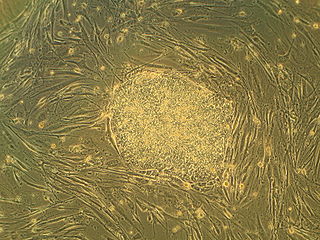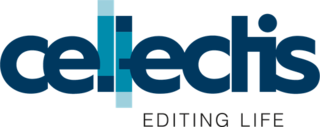Related Research Articles
Organ culture is the cultivation of either whole organs or parts of organs in vitro. It is a development from tissue culture methods of research, as the use of the actual in vitro organ itself allows for more accurate modelling of the functions of an organ in various states and conditions.

Security market is a component of the wider financial market where securities can be bought and sold between subjects of the economy, on the basis of demand and supply. Security markets encompasses stock markets, bond markets and derivatives markets where prices can be determined and participants both professional and non professional can meet.
OTC Markets Group, Inc. is an American financial services corporation that operates a financial market providing price and liquidity information for almost 12,400 over-the-counter (OTC) securities. The group has its headquarters in New York City. OTC-traded securities are organized into three markets to inform investors of opportunities and risks: OTCQX, OTCQB and Pink.

Regenerative medicine deals with the "process of replacing, engineering or regenerating human or animal cells, tissues or organs to restore or establish normal function". This field holds the promise of engineering damaged tissues and organs by stimulating the body's own repair mechanisms to functionally heal previously irreparable tissues or organs.

Cell therapy is a therapy in which viable cells are injected, grafted or implanted into a patient in order to effectuate a medicinal effect, for example, by transplanting T-cells capable of fighting cancer cells via cell-mediated immunity in the course of immunotherapy, or grafting stem cells to regenerate diseased tissues.
Stem-cell therapy uses stem cells to treat or prevent a disease or condition. As of 2024, the only FDA-approved therapy using stem cells is hematopoietic stem cell transplantation. This usually takes the form of a bone marrow or peripheral blood stem cell transplantation, but the cells can also be derived from umbilical cord blood. Research is underway to develop various sources for stem cells as well as to apply stem-cell treatments for neurodegenerative diseases and conditions such as diabetes and heart disease.
The two main methods for replacing bladder function involve either redirecting urine flow or replacing the bladder in situ. Replacement can be done with an artificial urinary bladder, an artificial organ.

Innovation Quarter in Winston-Salem, North Carolina, formerly Wake Forest Innovation Quarter, is an innovation district focused on research, business, and education in biomedical science, information technology, digital media, clinical services, and advanced materials. The Innovation Quarter, operated by Wake Forest Baptist Medical Center, is home to academic groups, private companies and other organizations located on 330 acres in downtown Winston-Salem. Its tenants include departments from five academic institutions—Wake Forest School of Medicine, Wake Forest University, Forsyth Technical Community College, Winston-Salem State University, UNC School of the Arts—as well as private businesses and other organizations. One tenant is the Wake Forest Institute for Regenerative Medicine (WFIRM), which is working to engineer more than 30 different replacement tissues and organs and to develop healing cell therapies. The science and research conducted at WFIRM is behind two start-up companies at Innovation Quarter. The ability of researchers and scientists to work alongside entrepreneurs furthers a goal of Innovation Quarter to develop new treatments and cures for disease and advances in technology.
NetBank, formerly named Atlanta Internet Bank (1996) and Net.B@nk (1998), was an American direct bank that operated between 1996 and 2007. Netbank suffered from bank failure and was closed by regulators on September 28, 2007.

Wake Forest University School of Medicine is the medical school of Wake Forest University, with two campuses located in Winston-Salem, North Carolina and Charlotte, North Carolina, United States. It is affiliated with Atrium Health Wake Forest Baptist, the academic medical center whose clinical arm is Atrium Health Wake Forest Baptist. In 2021, U.S. News & World Report ranked Wake Forest School of Medicine 48th best for research in the nation and 80th best for primary care. The School of Medicine also ranks in the top third of U.S. medical schools in funding from the National Institutes of Health (NIH).

Anthony Atala is an American bioengineer, urologist, and pediatric surgeon. He is the W.H. Boyce professor of urology, the founding director of the Wake Forest Institute for Regenerative Medicine, and the chair of the Department of Urology at Wake Forest School of Medicine in North Carolina. His work focuses on the science of regenerative medicine: "a practice that aims to refurbish diseased or damaged tissue using the body's own healthy cells".
The Wake Forest Institute for Regenerative Medicine (WFIRM) is a research institute affiliated with Wake Forest School of Medicine and located in Winston-Salem, North Carolina, United States
Velti is a mobile marketing company offering its services to mobile operators and brands. The company was founded in 2001, went public in London in 2006 and on NASDAQ in 2011. In 2013 Blackstone, acquired the assets of Velti and the company was taken private.

Cellectis is a French biopharmaceutical company. It develops genome-edited chimeric antigen receptor T-cell technologies for cancer immunotherapy. It has offices in Paris, New York City, and Raleigh, North Carolina.
Avita Medical is a clinical and commercial company developing and marketing a range of respiratory and regenerative products. The first regenerative medicine product brought to the market by Avita Medical was ReCell spray-on skin for the treatment of burns. The two latest products are ReNovaCell, for Aesthetics and Plastic applications including skin trauma, and ReGenerCell for the treatment of chronic wounds. The Avita Medical regenerative product range is currently marketed in Europe, the Middle East, Africa (EMEA) and Australia.

Heparan sulfate analogues are polymers engineered to mimic several properties of heparan sulfates. They can be constituted with a backbone of polysaccharides, such as poly glucose or glucuronates or a polyester such as co polymers of lactic or malic acid to which sulfates, sulfonate or carboxyl groups are added in controlled amounts and location. They have a molecular weight that can range from a few thousand to several hundred thousand Dalton. Heparan sulfates can sequester growth factors (GFs) and cytokines in the extracellular matrix (ECM) thereby protecting them from degradation. This ensures local presence of these signaling proteins to fulfill their function in the ECM which contributes to the preservation of anatomical form and function. Heparan sulfates bind to matrix proteins on specific sites called "heparan sulfate binding sites" on ECM macromolecules like collagen, fibronectin and laminin, to form a scaffold surrounding the cells and to protect ECM proteins and growth factors from proteolytic degradation by steric hindrance. However, at any site of inflammation, so also in wound areas, heparan sulfates are degraded, mainly by heparanases giving free access to protease to degrade the ECM and a subsequent loss of GFs and cytokines that disrupts the normal tissue homeostasis. Heparan sulfate analogues obtain many of the characteristics of heparan sulfates including the ability to sequester GFs and bind and protect matrix proteins. However, heparan sulfate analogues are resistant to enzymatic degradation. This way they strengthen the healing potential of the wound bed by repositioning GFs and cytokines back into the ECM.
Genital regeneration encompasses various forms of treatment for genital anomalies. The goal of these treatments is to restore form and function to male and female genitalia by taking advantage of innate responses in the body. In order to do this, doctors have experimented with stem cells and extracellular matrix to provide a framework for regenerating missing structures. More research is needed to successfully move the science from laboratory trials to routine procedures.

Tooth regeneration is a stem cell based regenerative medicine procedure in the field of tissue engineering and stem cell biology to replace damaged or lost teeth by regrowing them from autologous stem cells.

Limbal stem cells, also known as corneal epithelial stem cells, are unipotent stem cells located in the basal epithelial layer of the corneal limbus. They form the border between the cornea and the sclera. Characteristics of limbal stem cells include a slow turnover rate, high proliferative potential, clonogenicity, expression of stem cell markers, as well as the ability to regenerate the entire corneal epithelium. Limbal stem cell proliferation has the role of maintaining the cornea; for example, by replacing cells that are lost via tears. Additionally, these cells also prevent the conjunctival epithelial cells from migrating onto the surface of the cornea.
Vaccinogen Inc. is a US biotechnology company based in Baltimore. It is currently developing a potential cancer immunotherapy called OncoVAX, where a patient's own tumor cells are used as the vaccine, adjuvanted by BCG. This product was evaluated in Phase III in colon cancer in the 1990s and another Phase III study, called ACTIVE, is currently recruiting stage II colon cancer patients. Vaccinogen calls its approach 'Active Specific Immunotherapy' or ASI.
References
- ↑ Health Care Sector Wrap Archived 2012-08-18 at the Wayback Machine , FOX BUSINESS (August 14, 2012)
- ↑ "Bankrupt Tengion to Liquidate Assets". Genetic Engineering & Biotechnology News. Mary Ann Liebert, Inc. 31 December 2014. Retrieved 16 October 2024.
- 1 2 Craver, Richard (March 6, 2015). "Bankruptcy Court approves offer to buy Tengion". Winston-Salem Journal . Retrieved June 3, 2024.
- ↑ Perriello, Brad (6 August 2015). "Tengion successor RegenMedTX raises $4m". Mass Device. Retrieved 16 October 2024.
- ↑ Tengion completes move to Winston-Salem Archived 2012-01-20 at the Wayback Machine , Winston-Salem Journal (January 05, 2012)
- ↑ Tengion Inc., Hoover's
- ↑ Matt Evans, Tengion plans IPO around Atala’s groundbreaking work, The Business Journal (February 15, 2010)
- ↑ Anthony Atala: at the cutting edge of regenerative surgery, The Lancet (15 October 2011)
- ↑ Tengion Common Stock to Begin Trading on The OTCQB™ Tier of the OTC Marketplace on September 6, 2012 [ permanent dead link ], heraldonline.com (September 5, 2012)
- ↑ Tengion. Incontinent Urinary Diversion Using an Autologous Neo-Urinary Conduit. In: ClinicalTrials.gov [Internet]. Bethesda (MD): National Library of Medicine (US). 2000- [cited 2016 April 10th]. Available from: https://clinicaltrials.gov/ct2/show/NCT01087697 NLM Identifier: NCT01087697.